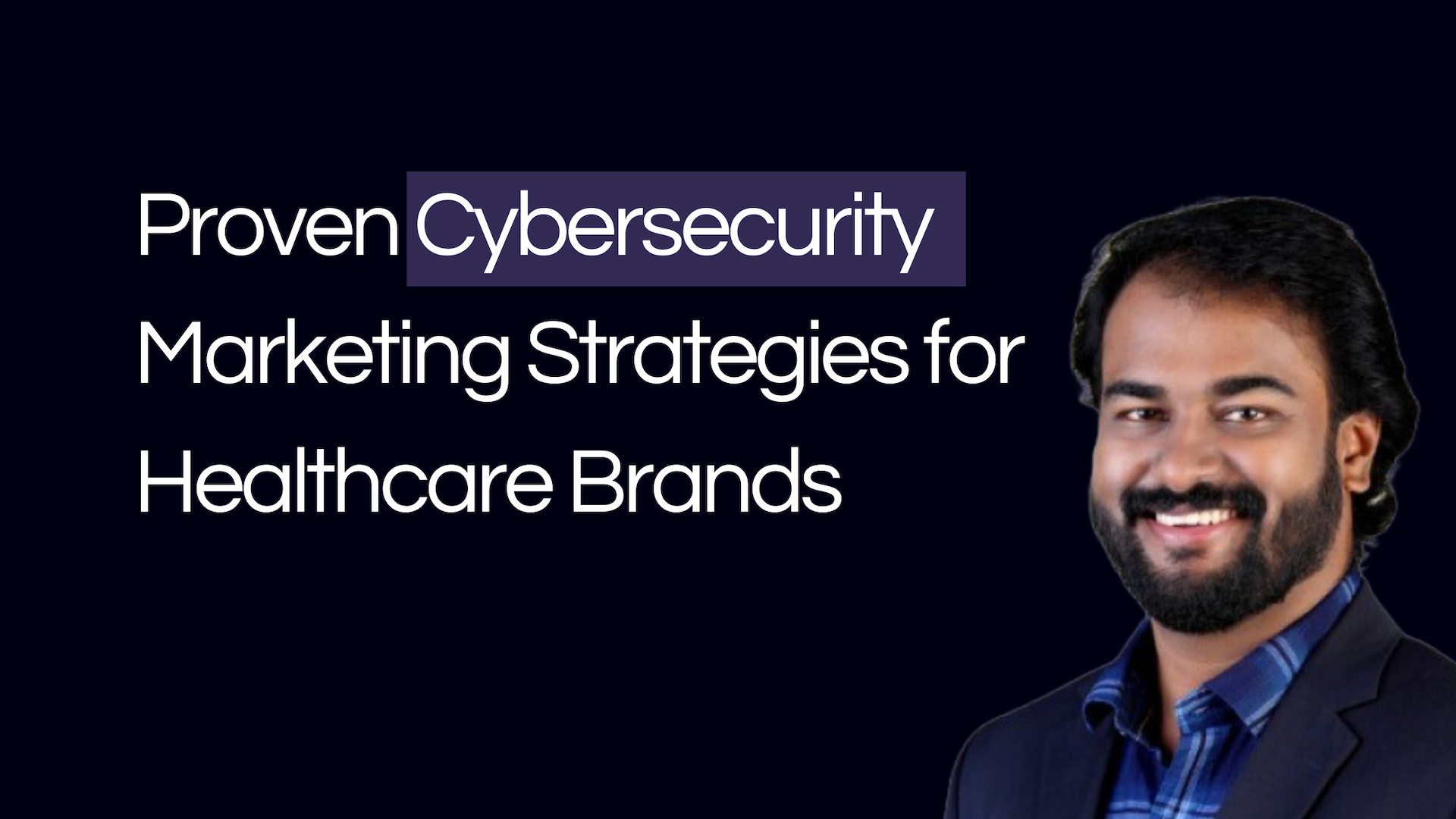
10 Proven Cybersecurity Marketing Strategies for Healthcare Brands
Have you considered how vulnerable your healthcare data is to cyber threats? The security of medical records, patient data, and hospital systems is crucial, yet it remains under constant attack from cybercriminals.
This topic is vital for cybersecurity founders looking to make a real impact in today’s digital health landscape.
This blog will guide you through ten strategies to effectively communicate the importance of robust cybersecurity measures in healthcare, ensuring your message resonates with healthcare providers and patients alike.
1. Design Your Message for Healthcare Professionals

Directly link cybersecurity to patient safety and operational efficiency. By making cybersecurity relevant to healthcare professionals’ primary concern—patient care—your message becomes more persuasive. This increases the likelihood of healthcare providers investing in cybersecurity solutions.
- Use Real-World Examples: Show specific instances where cybersecurity breaches affected patient care, such as delays in treatment or compromised patient records.
- Highlight Efficiency Gains: Explain how secure systems reduce downtime and improve the efficiency of medical staff, leading to better patient outcomes.
- Present Case Studies: Use case studies from other healthcare providers who benefited from enhanced cybersecurity measures.
2. Utilize Patient Testimonials
Leverage the powerful narratives of patients who have suffered from data breaches. Patient stories humanize data breach abstracts and create emotional engagement, compelling healthcare providers to act to protect their patients, thus driving demand for robust cybersecurity measures.
- Collect Patient Stories: Gather testimonials from patients affected by breaches, focusing on the personal impact and disruption to their care.
- Use in Marketing Materials: Incorporate these stories in presentations, brochures, and digital campaigns to emphasize the human aspect of cybersecurity.
- Create Video Testimonials: Produce videos where patients share their experiences, making the message more compelling and relatable.
3. Highlight Compliance and Regulatory Requirements
Focus on the legal and financial risks associated with non-compliance. Highlighting the consequences of non-compliance creates a sense of urgency and positions your cybersecurity solutions as necessary tools for legal and financial safeguarding, potentially increasing market penetration.
- Educate on Regulations: Provide clear information about regulations like HIPAA, GDPR, and PCI DSS, and the specific requirements for compliance.
- Discuss Legal Risks: Highlight the fines, legal actions, and reputational damage that can result from non-compliance.
- Showcase Compliance Success: Use examples of clients who successfully met regulatory requirements with your solutions, reinforcing your expertise.
4. Conduct a Thorough Risk Assessment
Begin with a comprehensive risk assessment for any healthcare organization seeking to bolster its cybersecurity defenses. This helps identify the most pressing vulnerabilities and enables targeted remediation strategies. This approach showcases your expertise in identifying risks and positions your solutions as essential, tailored responses that can lead to long-term engagements and trust with healthcare clients.
- Offer Risk Assessment Services: Provide detailed risk assessments that identify vulnerabilities in systems, networks, and processes.
- Deliver Comprehensive Reports: Present findings in a clear, actionable report that outlines the risks and recommended solutions.
- Propose Customized Solutions: Tailor your cybersecurity solutions to address the specific vulnerabilities identified in the assessment.
5. Ensure HIPAA Compliance through Cybersecurity Measures

Implement stringent cybersecurity measures to ensure compliance with health data protection regulations like HIPAA.
Emphasizing compliance highlights your commitment to legal standards and mitigates the risk of costly penalties for your clients. This adherence to compliance standards serves as a significant market differentiator.
- Focus on Compliance Features: Highlight features of your solutions that ensure HIPAA compliance, such as encryption, access controls, and audit trails.
- Provide Compliance Audits: Offer services that audit clients’ current systems for compliance and suggest improvements.
- Share Compliance Resources: Create guides and resources that help clients understand and achieve HIPAA compliance.
6. Implement Effective Cybersecurity Technologies
Adopt advanced cybersecurity technologies such as multi-factor authentication and end-to-end encryption to safeguard patient data.
By promoting cutting-edge technologies, you can demonstrate your role in advancing healthcare security, potentially leading to increased adoption rates and perceived value among healthcare providers.
- Promote Latest Technologies: Showcase technologies like AI-driven threat detection, blockchain for secure data sharing, and zero-trust architectures.
- Offer Demonstrations: Provide live demonstrations or trials of your technologies to show their effectiveness in real-world scenarios.
- Highlight Technology Benefits: Explain how these technologies protect patient data and enhance overall security posture.
7. Train Healthcare Staff on Cybersecurity Threats
Provide regular and comprehensive training for healthcare staff on identifying and responding to cybersecurity threats.
This approach helps prevent potential breaches and cultivates a culture of security within healthcare organizations. Offering training services can open additional revenue streams and deepen client relationships.
- Develop Training Programs: Create comprehensive training programs that cover common threats, phishing scams, and safe data handling practices.
- Use Interactive Tools: Incorporate simulations and interactive tools to make training engaging and effective.
- Schedule Regular Updates: Offer ongoing training sessions to keep staff updated on the latest threats and security practices.
8. Ensure Immediate Response to Data Breaches
Have an actionable incident response plan that can be swiftly executed following a data breach.
Quick and effective management of data breaches reduces potential damage and restores client trust.
Offering robust incident response services ensures that you are viewed as essential partners in crisis management.
- Develop Response Plans: Create detailed incident response plans tailored to different types of breaches.
- Offer 24/7 Support: Provide round-the-clock support to ensure immediate action can be taken in case of a breach.
- Conduct Drills and Simulations: Regularly test and update response plans through drills and simulations to ensure readiness.
9. Foster Partnerships with Healthcare Associations
Use partnerships to extend reach and enhance credibility.
Collaborating with established healthcare associations amplifies your marketing message across a wider audience and enhances the perceived reliability and credibility of your cybersecurity solutions.
- Build Strategic Partnerships: Collaborate with healthcare associations and industry groups to co-host events, webinars, and workshops.
- Leverage Joint Marketing: Use joint marketing campaigns and co-branded materials to reach a broader audience.
- Participate in Industry Events: Attend and present at industry conferences and events to build visibility and credibility.
10. Emphasize the Role of Every Employee in Cybersecurity

Promote cybersecurity as a shared responsibility. Campaigns that involve every hospital staff member in cybersecurity efforts help to create a culture of security.
This holistic approach not only reduces risks but also boosts the internal buy-in necessary for adopting comprehensive cybersecurity measures.
- Create Awareness Campaigns: Develop internal campaigns that highlight the importance of cybersecurity for all staff members.
- Encourage Participation: Involve employees in developing security policies and procedures to foster ownership and accountability.
- Recognize and Reward: Implement recognition programs to reward employees who actively contribute to improving cybersecurity practices.
Conclusion
By implementing these ten strategies, cybersecurity founders can effectively communicate the critical importance of cybersecurity in healthcare. Integrating real-life examples, regulatory insights, and technological solutions not only educates but also empowers healthcare providers to invest in their cybersecurity infrastructure.
Start implementing these strategies today to ensure the safety and security of your patients and systems
RECENT POSTS
Strategies to Use Customer Testimonials in Cybersecurity Marketing
Advanced Personalization Tips for Cybersecurity Email Campaigns
Strategic Upselling & Cross-Selling Techniques to Boost Cybersecurity Services Revenue
Want to scale your cybersecurity business?
Book a free consultation with me now.
